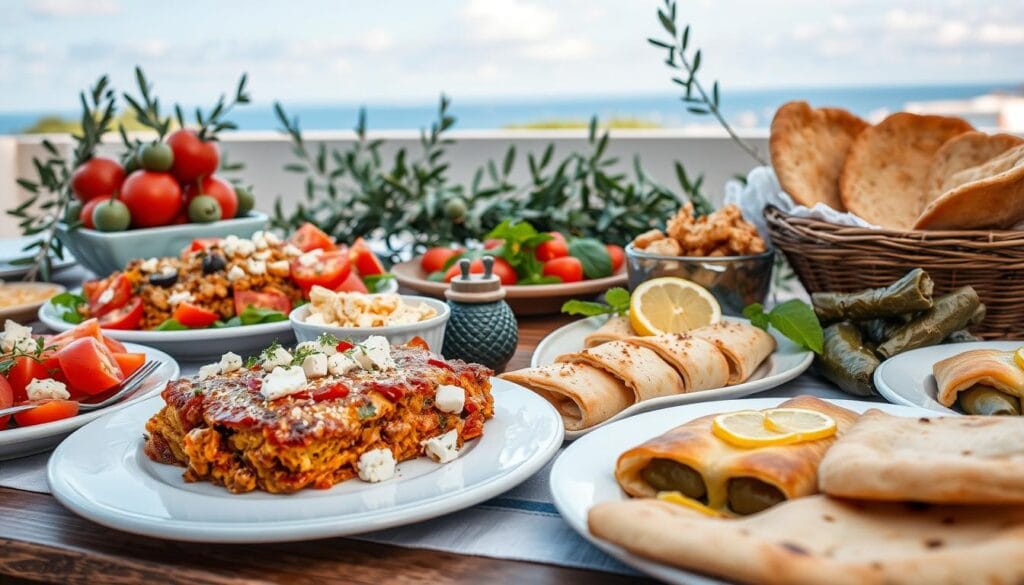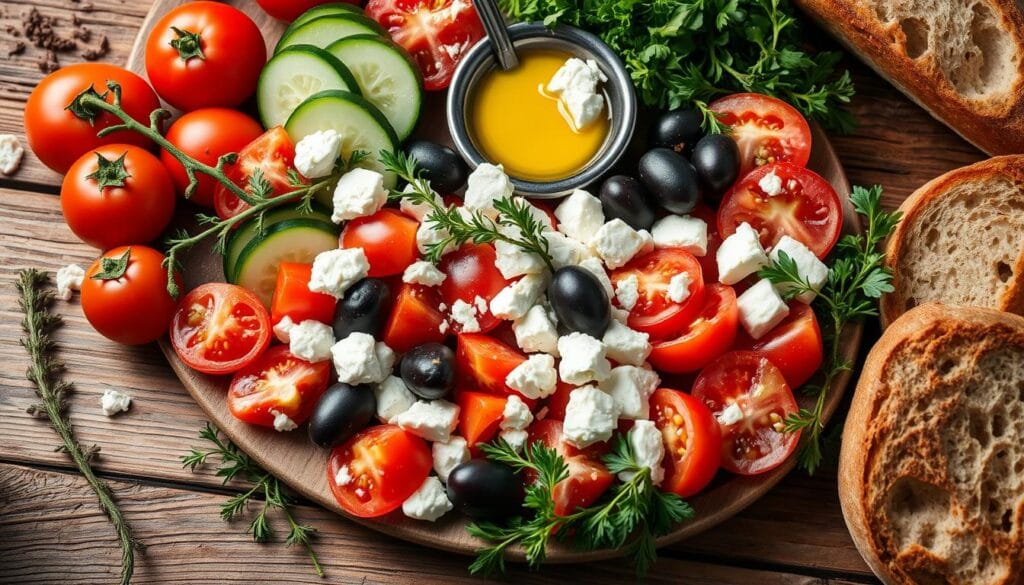Greek cuisine is a vibrant celebration of flavors rooted in the Mediterranean diet. It uses fresh, seasonal ingredients. Over centuries, Greek food has been shaped by cultural influences, especially from the Byzantine and Ottoman Empires. This mix of flavors and techniques makes Greek food a testament to tradition and a draw for travelers.
Exploring Greek food, I’m captivated by the harmony of ingredients and unique dishes. Each meal is a story, from the golden olive oil used in most dishes1 to the variety of vegetables and meats. Let’s discover popular traditional Greek dishes and the dining culture that makes eating in Greece special.
Key Takeaways
- Greek cuisine emphasizes the Mediterranean diet with a focus on fresh, seasonal ingredients.
- Olive oil is a key component, used in nearly every dish.
- There are various influences on Greek food, including Asian, Turkish, and Italian cuisines.
- The dining culture in Greece often involves communal meals in taverns.
- Popular traditional dishes include moussaka, souvlaki, and pastitsio.
- Travelers are increasingly drawn to Greece for its culinary experiences.
The Essentials of the Mediterranean Diet
The Mediterranean diet is all about eating fresh and healthy. It focuses on fruits, veggies, whole grains, legumes, nuts, seeds, and good fats. It also means cutting down on processed foods, added sugars, and refined grains2. These choices make my meals better and offer big health benefits.
Olive oil is key in Greek food, adding flavor and health perks. Studies show it lowers the risk of chronic diseases compared to the American diet2. I love the idea of enjoying red wine in moderation and eating with loved ones, key parts of the Mediterranean way.
My day includes lots of fruits and veggies, with legumes three times a week3. I aim for fish three times a week and snack on nuts and Greek yogurt3. These habits boost my health.
This diet also helps with weight control and prevents heart attacks and strokes2. It matches my love for tasty, healthy meals rooted in tradition. Enjoying grilled veggies and herbed fish connects me to the cuisine and my health.
Adopting these habits not only feeds my body but also enriches my life. It shows the heart of Mediterranean living.
What is Greek food mostly?

When I think of Greek food, I see a colorful mix of flavors shaped by tradition. Each bite is a taste of Greece’s fertile lands and seas. For thousands of years, Greeks have grown olives4. Many tavernas use their own olive oil, showing their culinary roots4.
Grilled meats like souvlaki and gyros are big in Greek meals. Fresh fish from the Mediterranean and Aegean Seas is common4. Meals begin with starters like courgette balls, made with courgette and spices4. Feta cheese, graviera, and mizithra add unique flavors4.
Sweets like baklava and galaktoboureko, made with olive oil and honey, end meals nicely4. Greek food is always changing, blending old and new5. In North America, menus show only a few Greek dishes5. But fresh ingredients and herbs like mint, dill, and oregano make Greek food special.
Popular Traditional Greek Dishes

Exploring traditional Greek dishes, I’m drawn to their vibrant flavors and unique cooking methods. A key part of Greek cuisine is the Greek meze. It’s a variety of small dishes meant to be shared. It’s not just about food; it’s about enjoying social time with a variety of tastes.
Overview of Greek Meze
In Greek meze, you’ll find tzatziki, melitzanosalata (eggplant dip), and many olives. These appetizers start a communal dining experience full of tradition and flavor. Another favorite is saganaki, fried cheese that’s a hit at gatherings.
Staples: Moussaka and Dolmades
Moussaka is a hearty dish that’s hard to beat. It’s layers of eggplant, minced meat, and béchamel sauce. It’s a comforting meal that always impresses. Dolmades, on the other hand, are vine leaves stuffed with rice, meat, and herbs. They show off the rich flavors of Greek cooking.
These dishes are the heart of Greek cuisine. They give a glimpse into cultural heritage and family traditions67.
Understanding Greek Ingredients

Greek cuisine is rich and varied, thanks to its ingredients. Olive oil is key, adding flavor and health benefits. Traditional herbs like oregano, dill, and mint add unique aromas to dishes.
Importance of Olive Oil and Herbs
Did you know Greece grows over 100 olive varieties? Kalamata olives are famous in Greek cooking8. Greek oregano has a distinct flavor, thanks to its broad leaves and thick stems8. It’s a must in many recipes, bringing the Mediterranean to life.
Key Vegetables and Grains in Greek Cooking
Vegetables are crucial in Greek meals. Tomatoes, zucchini, eggplant, and peppers add flavor and nutrition. Eggplant, for example, is used in moussaka and melitzanosalata dip, showing its versatility8.
Grains like barley and wheat are also common. Greek dishes often use whole grains, which are healthier than refined grains9.
The Influence of History on Greek Cuisine
The history of Greek cuisine is deeply tied to the country’s cultural growth. It shows a mix of ancient Greek food basics like olives, grapes, and honey from ancient times (1200 BC to 600 AD). These items are still key in cooking today10. The Byzantine era (300 AD to 1500 AD) brought rich sauces using olive oil, wine, and herbs10.
The Byzantine and Ottoman influences added new tastes, like cinnamon and oregano. These spices and herbs greatly shaped Greek cooking1011.
The Ottoman rule from 1500 to 1821 made Greek dishes richer with new ingredients. After Greece gained independence in 1821, there was a push to keep ancient Greek food traditions alive. This included dishes like moussaka and salted cod for special events10.
Greek cuisine stands out because of its regional flavors. Places like Thessaloniki add unique tastes through cultural mixing12. Migration and trade have enriched Greek food, focusing on local ingredients and cooking methods. Today, Greek cuisine blends old traditions with new trends11.
Regional Variations of Greek Food
Exploring Greek cuisine shows how local ingredients shape dishes. Crete is known for tsigariasto, a slow-cooked beef stew. It uses ingredients from the island. Also, kaltsounia, a cheese-filled pastry, highlights Cretan flavors, showing the island’s unique taste13.
The Ionian Islands have their own special dishes. Bourdeto, a spicy fish stew, is made with fresh herbs and olive oil. It shows the region’s love for *island flavors*13. The Dodecanese Islands are known for giaprakia, stuffed grape leaves with pine resin and honey syrup13.
The Peloponnese Peninsula is rich in olive and citrus trees. It’s famous for Kalamata olives and orange-flavored sausages. Olive oil is key in dishes like syglino and sfela, a local cheese14.
Traveling through Greece, I find each region’s unique flavors. The mix of *island flavors* and local ingredients makes Greek cuisine diverse. It shows the importance of understanding the *variations in Greek food*, reflecting each area’s history and culture1314.
Greek Dining Culture and Food Traditions
In Greece, eating is more than just filling your belly. It’s a way to connect with others through food. Taverns, or tavernas, are the heart of local dining. They offer a cozy spot to enjoy traditional dishes, often shared among friends and family.
Dining Out in Taverns
Going out to taverns is a big part of Greek life. It’s where you can taste the real flavors of Greece. Meals are shared, making it a time for laughter and stories.
Dishes are often served in big portions, meant to be shared. This way, everyone gets to try a little bit of everything. It’s a way to bring people together, celebrating the Mediterranean diet’s health benefits15.
The Role of Family in Greek Culinary Practices
Family is at the center of Greek meals. Food shows love and welcome. Recipes are passed down, keeping traditions alive.
Preparing meals can take hours, showing the love put into cooking. These meals are a chance for families to bond. Food brings them closer, strengthening their ties16.
Conclusion
Exploring Greek cuisine has shown me its rich history and varied flavors. Traditional dishes like moussaka and meze highlight the importance of fresh, local ingredients. These ingredients add a burst of flavor and nutrition to Greek dishes17.
Olive oil, herbs, and quality dairy products like Greek yogurt and feta cheese are key to Greek dishes’ unique taste17. This makes Greek food stand out.
The Mediterranean diet, which Greek cuisine follows, is all about whole foods. It includes fruits, vegetables, and lean proteins. This diet is great for health and fits today’s wellness trends18.
Eating in a local taverna, where meze are shared, adds to the fun. It brings people together over food18.
Grilling seafood and using traditional cooking methods has deepened my respect for Greek cooking. Desserts like Baklava and Loukoumades show the joy of Greek cuisine. They invite everyone to enjoy the rich flavors of this vibrant culture18.
Greek cuisine is more than just food. It’s a journey of flavors and connections that touch our hearts.
FAQ
What is Greek food mostly about?
What are the essentials of the Mediterranean diet?
What makes Greek food unique?
What are some popular traditional Greek dishes?
Why is olive oil important in Greek cooking?
How has history influenced Greek cuisine?
What are the regional variations of Greek food?
What is the dining culture like in Greece?
Source Links
- Greek cuisine
- Mediterranean Diet 101: Meal Plan, Foods List, and Tips
- What Is the Mediterranean Diet?
- Top 10 foods to try in Greece
- Everything I Know About Greek Food
- 7 Essential Greek Dishes Everyone Needs to Try
- Top 24 Classic Greek Foods & Dishes
- 30 Essential Greek Ingredients, Explained – Tasting Table
- Understanding Greek and Mediterranean Cuisine: An Expert Guide – The Great Greek Mediterranean Grill in Charleston
- The history of Greek cuisine – Food Around Athens
- Food History of Greece
- Greek Cuisine: Its Evolution and Influences – Greek News Agenda
- Regional Variations In Greek Cuisine – Cretan, Northern, Etc. » Princess Pita
- Greek cuisine: Your ultimate guide to Greece’s culinary treasures | Greekality
- Food in Greece – Everything you should know about Greece food culture – Delicious Athens
- An introduction to Greek food culture & why it is unique
- Greek Gastronomy – 7 Traits That Set Greek Food Apart
- The Foundations of Flavor: An Introduction to Greek Cuisine
















